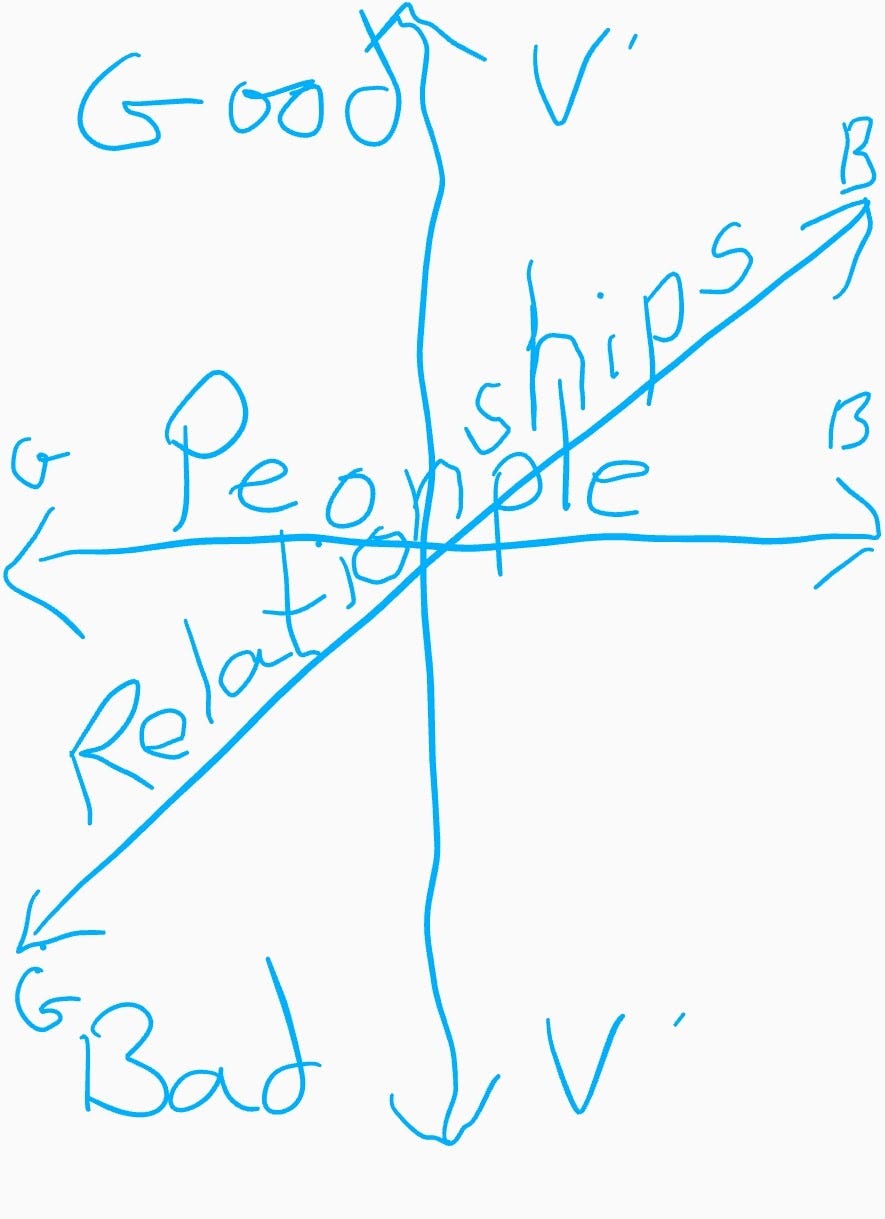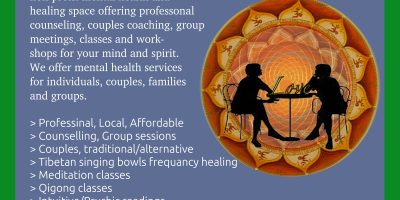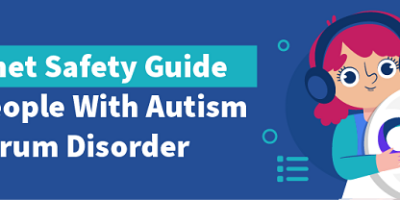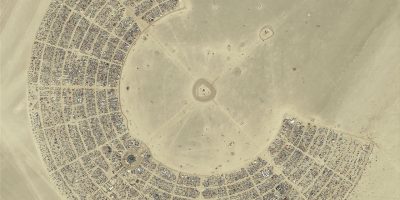In this broad question, three common ideas will need to be identified and narrowed down to specifics. Thus, “good”, “relationship”, and “makes” will be discussed in detail. Our goal is to understand the what of a good relationship. ln the end we hope to discover the necessary ingredients needed to make a good relationship.
Good
The opposite of bad is good, so we are looking for a not-bad relationship. This though is a philosophical definition, and I think a better one would be a description of good. “Good” in what context? well relationships of course. To do this though, we first must understand “good” standing alone.
I can describe good too. It’s being kind and respectful, gentle and patient; it’s good to be empathic and sensitive to others feelings and thoughts, words and desires. It is good to feel understood and to say you can understand others. So understanding is also good. The light is good, as the dark is bad. It’s good to share and be generous. All feelings are good, but not all feelings are positive, so good is not only positive, or good is not about being positive or negative, but about being honest –with your feelings, your thoughts and actions. So It’s good to be honest. Finally, and most difficult to explain, change is good. I come to this conclusion by noting that both creation and destruction are, or can be, good. It is not the fact that things are being created or destroyed that determines things to be good or bad, it is the fact that change is accepted as a reality. Whether it’s something being created or destroyed, change is a necessary part of life. This realization is good, the fact that things change is to be accepted not resisted, then change too is good.
Good has a flowing energy to it. It is dynamic and in flux, moving about in honest, kind, patient gestures of feeling, action and thought. Good brings light to a situation, there is greater and/or complete understanding of things, people or events in the good. For this reason what was considered bad in an earlier state of ignorance can change into the good through awareness, understanding and growth or development. Good is not fixed, but changes with time, place and culture. Good itself is a force that we are watching grow-up into its maturity. As we evolve and increase our individual and/or collective understanding through awareness and knowledge, we see good expanding, growing and becoming more present, influential, less abstract and unfamiliar. In this sense, good is an energy that you perceive through higher consciousness and greater understanding and deeper knowledge.
For example, take the destructive power of fire. From certain narrower, limited and dense perceptions, fire seems like a destructive force. It could be seen as bad from a certain primitive point of view. Taken from a grander, broader awareness, the perception of fire changes. Through control, rebirth or vastness, the power of fire is harnessed to bring forth life, change and sustenance. Fire has kept humanity warm through strict control and limited release. Fire can remove the old and make way for the new. This happens naturally in forest fires, and unnaturally in human’s demolition of old buildings with explosives. Then the unleashed, free expression of fire, as seen in our sun and all the stars, is diminished to dots of light, or our distant Sun, through the vastness of space — the universe. Nuclear explosions and fusion reactions creating more heat, light and energy than can be imagined is constantly occurring throughout the galaxies, and making up the content of the universe. All this power brings life to Earth and, I believe, many other planets because of the vast size of space.
Fire is a good force in the universe, when seen through eyes of knowledge and awareness, not a bad force, as when looked at through the eyes of a primate who had just been burnt by the hot flame. The trick is to expand your awareness, knowledge and understanding of something, and it’s place in the whole scheme of things.
Relationship
Using the philosophical approach first, let’s talk about the opposite of relationship. It’s not easy to say what it’s opposite is, but the essence and spirit of relationship is togetherness, couples at least and broadening the number of connections with the growth of culture, awareness and knowledge. So in that sense being alone is the opposite of being in a relationship.
So a relationship is not being alone, even though you can and do have a relationship with yourself, nonetheless in our understanding of relationship, it involves at least two people. In fact, for the duration of this essay, relationship will be about two people having a long-term, intimate relationship.
Now that we are moving out of the philosophical of relationship, and moving into the reality of being in a relationship, we acknowledge that there are many, many different kinds of relationship. There are familial relationships, business/work relationships, friendships, a category of its own really, and one I will approach individually. There are causal relationships, intimate and platonic, and the list grows as you consider teacher-student relationships etc.. I’m going to narrow our discussion on relationships to mean only long-term, intimate, domestic, love-based relationships.
So we understand that relationships are about creating, nurturing and seeking to grow a connection into a long-term relationship of love, honesty, respect, kindness, possibly family and/or children, growth and change. We also understand that this is a good relationship. The question remains, how to have a good relationship.
Makes
Finally we get to the crux of the matter, to make a good relationship. So what is the opposite of make? Maybe destroy? So in this sense, we are trying to not destroy our relationship. Stating on the philosophical wagon, we see that if we are not making relationships, then we are destroying them. There is a continuum here between making and destroying, so it’s not like you are either making or destroying your relationship, rather there is always a moving towards or away from relationships. Still the philosophical warming is that if you are having relationship troubles, you could be moving away from making a good relationship. Philosophically, I get this, but in reality, as with the view of fire’s goodness, the trouble we feel and face in our relationship does not mean that we’re destroying our relationship. With the right attitude relationship struggles can be the catalysts for change. It is the perceptions of self and other which determine whether your relationship is being nurtured or neglected. Relationships, when seen through the right point of view can be catalysts of personal growth and social change. Which really means there is both bad and good in both good and bad relationships, the deciding factor is personal perceptions, awareness and the desire to see the good in the bad.
Are you following this philosophical argument? Briefly, it says that what makes a good relationship is a deeper awareness, more knowledge and higher consciousness. There are no lists of do’s and don’ts that can make your relationship good, because there is always going to be both bad and good in your relationship. Rather, your personal need and action for growth, knowledge, change and awareness or understanding are what makes your relationship good.
Still, we ask, how can we make that philosophy more accessible to the common person? The answer is personal, and we begin by asking what are my struggles in this relationship? There are a number of similar struggles and areas of stress and negative feelings. For instance there is money; children, or parenting really, because it’s not actually the children causing the struggle, rather it’s the parents clash in style, approach and understanding of what being a parent means; intimacy; abuse; cheating or unfaithfulness; dishonesty and mental or physical illness to name just a few of the more common problems that couples face in relationships.
Note again –from a philosophical point of view– being able to identify the struggles in your relationship is the beginning of being able to shift your perceptions. Reading between the lines, we are saying that love stirs all parts of the soul, not just the fine and good. Love also opens up the box to your hidden and avoided feelings, thoughts and patterns. Going with the flow of love’s offerings will make receiving all of love’s gifts easier.
Each area of relationship struggle may have a form and recipe for change. I don’t want to go over each individually, although in reality this is what we are doing with most relationship counseling and how-to books. Each couple is a unique expression of these widespread problems. These individual experiences of these general areas in feeling struggles, teaches us that it is not the expression of the struggle that needs to be addressed, it is the problem itself, except as a means to personal growth, awareness and self-acceptance. Why do so many people struggle with their finances in relationships? Why do so many couples feel the sting and ache of infidelity, and cheating hearts and bodies? Why are so many couples dealing with abuse, both physical and psychological? Why indeed!
Looking back at what is being said here, we see that there are two main reasons for relationship struggles. One is personal and comes from within. This represents the demons you must face, which are your own; the hurts and pains from your childhood, the flaws in your own ego, mental health and body, including chronic illness, acute illness and injury. For these inner struggles and forces of change, you look to your lover as a support in the work that you have to do on your own existence. There is an understanding that this is a reciprocal exchange. Your lover is not going to change you or even help to change you. They will be there for you as a support, and that will have many expression, and offer you a shoulder to lean on, a heart to share with and a hand to hold as you face your own inner child, demons and weaknesses.
The other source of personal change is external. This is huge, and can come in so many forms. As the inner struggle, which is actually also extremely vast, was greatly simplified into a few categories, so too can the external forces of change be categorised. This is not a complete list either, but lets include here: Government and State; Family and children; Religion and Church; career/vocation/finances; domestic space and needs; natural disasters, and people as on “other” category. These too will have unique expression throughout the world by people in relationships, and the written prose does not accommodate those individual expressions of people’s and couple’s struggles (with the World).
Change is still mostly from within here too, but still great social and cultural change has been initiated through unique people seeing a better way of living. They have stepped out of their comfort zone and for their children, fought against the current system. These people have always been present in humanity. They have been the instigators of change, the pioneers of cultural growth, and had a vision of a world that was better, more fair and just, an improvement from what there is now. What is more, is that these people shared their vision and moved towards the changes needed.
What does this have to do with your intimate relationships? Well, for the most, not much. Some of these external influences are not things that can be changed, so if it is causing trouble in your relationship, then you need to find some way to accept your fate in life, change your perceptions, or possibly move. That may put more stress on the relationship and not be worth the change. Your partner though is there with you to talk, share, listen and stand with you in facing these external forces and institutions and people who are causing or instigating struggles in your relationship. Here, as you face the world, you are facing it together. You are not alone, you are supported and believed in by your partner.
The challenge, I think, is in being able to distinguish between the two different sources of the feelings you have while in your relationship. Our response to either will be different. The struggles that come from within are handled differently than those coming from without. Inner struggles are, for the most part, faced, accepted and then overcome; well, dealt with, in any number of ways. The acceptance is the key to change from an inner perspective. Struggles coming from without are first off handled together. This is, remember, a dialogue about couples, and how they can create a good relationship. When facing the reality of your world from a relationship point of view, you must do it together. You are to create a unified front against the struggle you both, or even just one of you, feel. You don’t have to confront either, you both can agree to change your situation together, to modify your own existence in response to this felt tension in the relationship. This unified approach creates a bond between the people in the relationship that is strong, empowering and potentially long lasting.
This need for unity or togetherness demands good relationship tools to have healthy relationships, which are good. Communication, honesty, respect and trust are all nurtured in both the inner and outer struggles in your relationship. Remember, this relationship is founded upon love and intimacy in a long-term and domestic setting/scale.
Looking in detail like this at the components of a good relationship brings to our attention and realization that it is the people in the relationship who make it good or bad. We all have inner struggles and demons to face, it is in how we face these things that determines the fabric of our being –your character. We also share a common external world. Since these things are common and relatively equal among all people, the determinants of having a good relationship or not, will be upon those in the relationship. The common, necessary trait to have is the ability and practice of learning about yourself and your environment. Knowledge is power, and as we can harness more of this amazing allie, we are able to expand awareness and deepen both personal and collective consciousness. In general this desire to grow personally, or this type of person will have good relationships.
Empiricism versus Intuition
Then we want to measure this phenomena. How to measure the degree of goodness in a relationship is to give the people in it a test on a scale of goodness-badness, possibly on multiple axis. Then based on these test results, we can identify the degree of “goodness” possible in the relationship (or “badness”). This scale and test may already exist, so why bother recreating it myself.
I would like to be able to create a simple scale of relationship goodness/badness too. Then have people in long-term relationships measure themselves on this good/bad relationship scale. Then give the individuals in the relationship a test that can measure their degree of good or bad character. Compare this finding with their perception of their own relationship. Note differences between couples perceptions of the relationship and in their score on the good/bad tests

Diagram 1. Three dimension conceptual map of relationships, people and choice between good and bad.
In theory the people will generally fall along the dotted line. I suspect though in practice people will create a small circle of points near the center, and not enough on the extremities to determine anything.
The knowledge known as intuition is not respected or trusted enough, so the empirical method becomes the trusted mode of research and knowledge acquisition. This is a mistake, and the solution is not to pendulum action back to intuition, but to find a balance between intuition and empirical knowledge. To use both in the process of increasing awareness and consciousness. So does this becomes a contest between intuition and empirical knowledge? No, it is the synthesis of intuition and empirical knowledge. It is the awareness of intuition and its role in the increase of knowledge, awareness and consciousness.
There are two streams of knowledge to access now, both rather esoteric in nature. The one is about the flow of knowledge while the other is about the finding and discovering knowledge, and to have full access to all knowledge means that the researcher stay in touch with both. Intuition through meditation and contemplation, and empirical through hypotheses and data collection. Both forms of knowledge are valid and necessary in the process of increasing awareness and consciousness. From this point, because of the cumbersome nature of empirical knowledge, we will stay in the realm of intuition. It is with my intuition that I make my conclusions about what makes a good relationship.
CONCLUSION
In this essay it was determined that the specific kind of relationship being discussed is the long-term, intimate and domestic (as in living together) kind. It is the romantic connection growing into a long-term, domestic, intimate relationship. After identifying what kind of relationship we were discussing, we needed to define, or at least understand what we meant by good.
I never did come up with a different word than “good”. It just seems like such an overused word. Why and how could we use such a label in what is trying to be an academic research proposal with measurements that test specific human characters, and answer questions about how this may affect relationships. A number of different words were presented as pieces of the whole concept ”good”, which is huge, complex and even changing over time and across space. “Good” is not an object that you can hold or even point to. “Good” is a perception and/or awareness, it is the acquisition of valuable knowledge with the integration into your life the fruits of your knowledge. In this process over a single lifetime and across generations “good” is a state of consciousness. What was considered “good” a thousand years ago is “bad” today, and what was feared as “bad” yesteryear, is today understood as “good”.
Some of the words presented in our discussion about what is considered good today in this kind of relationship were: honesty, love, respect, kindness, family, growth and change, there is a flowing in our good relationships.
Finally, we discussed the how to create question, and realized that there is no formula nor actions needed, words said or not to making a good relationship last. Instead there are good people who live good lives and create good relationships. Does this mean that bad people will create bad long-term, intimate relationships? Does this also mean that if you are having a bad relationship, and maybe we need to define this better in order to answer the question well, that you are a bad person or the other is? There are many questions that can be explored.
Intuitively though, I do believe that these questions will be answered as true. Human behaviour and people are too complex to create any without exception set of rules, but I feel or believe that what makes good relationships also makes good people, and therefore to have or make a good relationship, you need to be a good person, or cultivating good character more that you are bad.
The trick (if you are looking for one) to creating and having a good long-term, intimate and domestic relationship is to become a good person. This means work on yourself first when you are struggling in your relationship. You are to look at yourself first when you are confused, hurt or in pain, and ask yourself: what is my role and part in this pain or suffering? What can I learn about life, myself, an institution, my career or reflect to my partner in this challenging situation I have found myself in with this person, my lover.
There is no blame or shame in this response in that you are not looking to your partner for causes of your pain. There is no shame either, in that you accept that all feelings are good, even these ones, which are hurting you right now. There is acceptance in this approach, both of self and others/circumstances, not resistance of the self, your circumstances nor others.
There is no losing your temper, and letting sadness grow into anger and then worse fear. Instead the initial feelings of sadness, the pain or hurt are acknowledged and not resisted. When we are honest with our feelings we can be more real with our thoughts, emotions and responses to those feelings. This allows for calm, respectful expressions of both feelings and emotions. Vulnerability is achieved through honest self reflection and kind, generous responses from our partners. Over time this kind of relationship will solidify into a beautiful, strong, enduring understanding between two (or more?) people. This connection will generate and be filled with love.
Without the correct point of view, this relationship could be missed. Now I’m not sure who is judging at that/this moment, yet each relationship has the potential to be good, and those which are not, are not good because of the people involved. Their awareness is limited, the knowledge they have is not meaningful, and as a result of all kinds of things beyond the two in a relationship, their level of consciousness is not mature or … “good”. Because it is simply a point of view, all that is needed to turn your difficult, challenging, painful relationship into a good relationship is to shift how you see it and yourself in it. If how you see yourself in it is not congruent with your inner self perceptions, then something has got to change. Still, change is a part of a good relationship, so needing to change is not bad. It is the resistance to change that causes grief. Also ignorance of the need to change can cause grief in couples, which again indicates the knowledge, awareness and consciousness are key determiners of having a good relationship.
Finally, a good person will get out of a bad relationship. The difference is in how they remove themselves. They will maintain their good character, and even likely deepen this golden light expression of humanity. They will be kind, gentle, respectful and honest in presenting and fulfilling their needs, which will be to exit and or change this relationship. We can not change other people, so when a good person finds themselves in a bad relationship, they conclude that the relationship must change. If in changing the relationship the other person sees their folly, and begins to change themselves, then possibly the connection can be salvaged. A new relationship is being born and nurtured between the same people because one or both have changed from the inside out creating a new person with whom to have this new relationship.
Like what you read? Sign up for Chris’s monthly newsletter, the Wellness Cafe that explores the latest insights in psychology, spirituality, relationships and the journey of building an intentional community. Chris R. is a trans-personal psychology pioneer in mental health practices and alternative relationship coach. He lives and works in BC at the Wellness Cafe, a non-profit organization bringing high quality alternative mental health services to the public at affordable costs. Continue to conversation and find Chris on Telegram or Librti.com




